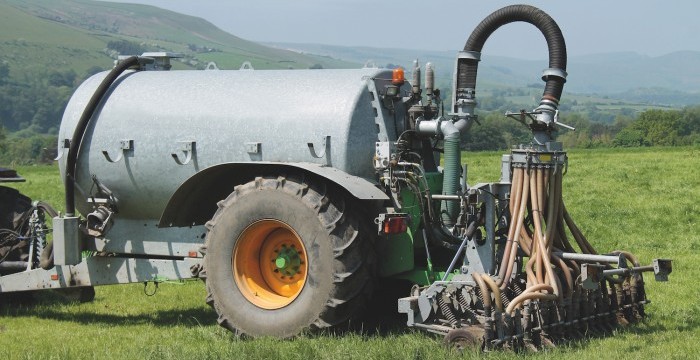The NFU has described the Environment Agency’s long-awaited statement clarifying the requirements of the Farming Rules for Water – Rule 1 as a ‘missed opportunity’ that could hamper farming operations.
The agency has published a Regulatory Position Statement (RPS), which relates to the application of organic materials in England.
The RPS allows farmers to apply organic manure to agricultural land that may exceed the needs of the soil or crop on that land, but must not cause a risk of pollution. It requires farmers to plan nutrient applications of organic material (livestock manures and slurries, digestate and biosolids) and manufactured fertiliser to crops, taking into account risks to water from nitrogen (N) and phosphorous (P).
The agency said the RPS will enable current practice to continue in most situations and alleviate the immediate concerns of those managing large quantities of organic material.
The Environment Agency’s interpretation of Rule 1 (or Regulation 4), which has been subject to intense scrutiny and discussion for some time, requires that:
“The application of organic manure and manufactured fertiliser to agricultural land must be planned so that the application does not exceed the needs of the soil and crop on land, or give rise to a significant risk of agricultural diffuse pollution. They must also consider the weather conditions and forecasts for the land at the time of application. It applies to all organic manures and all land managers.”
Farmers must have a contingency plan to avoid causing pollution of the environment that shows the use of the RPS is your only option. The plan should include field inspections to assess whether organic manures are likely to get into surface water or groundwater.
Farmers can have a planned application of organic manure to agricultural land that exceeds the crop and soil needs on that land provided it does not cause pollution and meets certain conditions:
- You can only spread organic materials on low leaching and run-off risk land. For the purposes of the RPS that is where:
- The soil is not a sandy or shallow, within the meaning of the nitrate vulnerable zones
- The land is not left bare over winter
- It is land with an average slope of less than 8 degrees, and drainage is not impeded (ie does not have compacted soil or a soil surface which is capped – you can only spread where the soil is permeable and has a good structure)
- The soil is not at field capacity above a land drainage system (other than sealed impermeable pipe) or shallow groundwater
- The land does not have cracked soil above a land drainage system or shallow groundwater
the land has not been pipe-drained, mole-drained, or sub-soiled in the last 12 months - The land is not within a designated groundwater source protection zone 1
- You spread at least 10 metres from surface water or a conduit leading to surface water
- You spread at least 50 metres from springs, wells, and boreholes
- You can only spread when weather and ground conditions allow in accordance with the Farming Rules for Water and good agricultural practice.
The RPS applies only for spreading up to 1 March 2022 and farmers must tell the EA they are using it.The agency said this would enable it to demonstrate the RPS is necessary and there is a demand for it, if it is needed in future years.
- You can view EA guidance on the RPS HERE
- You can download a comprehensive EA Q&A on the new rules HERE
Industry reaction

NFU Deputy President Stuart Roberts said: “Today’s announcement is a missed opportunity to provide much needed clarity for farmers who have significant concerns on how ‘rule 1’ of the farming rules for water regulations is being interpreted.
“I am deeply disappointed with the content of the statement by the Environment Agency, which sets an idealistic and impractical barrier in many farming situations. We’ve made multiple approaches over the past two years urging Defra and the Environment Agency to set achievable objectives to make best use of organic manures, slurries and biowastes – this seems to have been ignored – and I am still to hear from Defra Ministers despite having written twice in recent months.
“To find ourselves in this situation so close to autumn shows a complete lack of appreciation of the bigger picture; these materials improve soil health and replace man-made fertilisers while use at this time of year reduces ammonia emissions compared to applications in the spring. This legislation must be applied in a way that recognises the wider benefits of using organic manures sustainably.
“The NFU will continue discussions with the Environment Agency, government and industry stakeholders – but a longer-term and more sustainable solution is urgently needed that benefits both farmers and the environment.”
NPA policy services officer Lizzie Wilson said: “NPA have been involved in discussions on the change in practice required for some time and highlighted the potential significant impact on nutrient planning, diffuse pollution and ultimately farming businesses.
“We are pleased, therefore, that our members have been provided with much needed clarity on the spreading of slurry and FYM ahead of the autumn application period.
“However, this will only resolve the issue for this growing season, so we will continue to engage with other industry stakeholders, the Environment Agency and with government to find a long-term, more sustainable solution beyond spring 2022 that benefits both farmers and the environment.”




